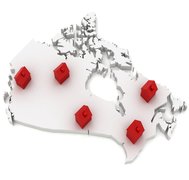Canada’s Second Mortgage Rate Increase in a Row – What Does it Mean to You?
 Back in September, for the second time this year, the Bank of Canada raised interest rates, leading to the inevitable mortgage rate increase at banks and lending institutions across the country. How does the latest BOC interest rate increase impact you?
Back in September, for the second time this year, the Bank of Canada raised interest rates, leading to the inevitable mortgage rate increase at banks and lending institutions across the country. How does the latest BOC interest rate increase impact you?
After seven years of historically low interest rates, analysts and economists predicted that a mortgage rate increase was in the cards. Experts predicted that the BOC would raise rates because of the unending growth of hot urban real estate markets like Vancouver and Toronto and the increasing levels of consumer debt carried by Canadians. They also noted that, despite all signs indicating weak inflation, the economy continues to exceed expectations.
After months of speculation, in July the BOC finally posted the first overnight rate increase in what seemed like forever. But it was the most recent increase in September to a full 1% that really surprised some economists, many of whom believed that at least a few more months would be required to have the economy settle after the first rate increase.
Macleans suggests that this will be the last rise for some time while the BOC monitors the “sensitivity of the economy to higher interest rates.” However, Business News Network put forward an argument that the BOC could just as easily justify rate hike number three as early as October. At the beginning of 2017, economists predicted rates would rise by 1.25% sometime in early 2018. Could it happen even earlier?
Why are interest rates rising? In a nutshell, when economic growth is high, as it is in Canada currently, demand for money increases, pushing the interest rates up. And, with the overnight rate at 1%, the mortgage rates at the Big Five banks went up accordingly.
Mortgage rates now range from 3.25% to almost 5% on a 5-year fixed-term mortgage. Compared to an average rate of 2.3% just a few months ago, such an increase could make obtaining a new mortgage more difficult, especially for anyone with outstanding debt. This is especially true if there’s going to be another rate hike this year.
To improve your circumstances, whether you’re planning on seeking financing at those higher rates or just want to be prepared, you should tackle your overall debt. A great way to do this is by taking advantage of the equity in your home. Home equity loans allow you to borrow against the value stored in your home. They can be useful for borrowing large amounts of money, and they’re easier to qualify for than other types of loans because they are secured against your house.
If your home is worth more than you owe on it, a home equity loan can provide funds for anything you want (you don’t just have to use it on home-related expenses, for example). A home equity loan is a type of second mortgage.
After the recent mortgage rate increase, it may be time for you to take a good look at your financial situation before another one is announced. Whether tapping into your home equity, renewing or refinancing your mortgage, or getting a second mortgage, you could potentially save hundreds, even thousands, of dollars. With so many options available, it may seem impossible to decide which option is best for you.
Before you make a decision, we recommend consulting a financial professional first, someone with your best interests in mind who can guide you to the best solution for you.
At DebtCare, we can help you choose the best options to suit your needs and your budget.
Call us today at: 1 (888) 890-0888.


